Another Timbre TimHarrisonbre
‘Evening Star, Vesper Bell’ (2022) 54:10
Bridget Carey, viola Heather Roche, clarinet
Anton Lukoszevieze, cello Chihiro Ono, violin
Simon Limbrick, percussion & vibraphone
with Magnus Granberg, prepared piano
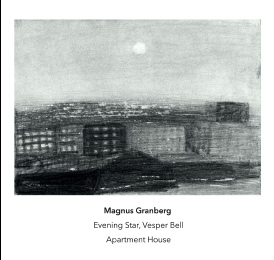
Magnus Granberg
Magnus Granberg has appeared on Another Timbre more than any other composer. ‘Evening Star, Vesper Bell’ is the tenth CD of his music to be released on this label, a relationship that began with ‘Ist gefallen in den Schnee’ back in 2012. Coming from a background in improvisation, Magnus had become frustrated with the difficulties of producing satisfactory results in larger group improvisations. He formed the ensemble Skogen in his native Sweden to work with a group of like-minded musicians to try to develop a way of combining the openness, flexibility and ‘live’ qualities of improvisation with the structure and control that comes with composition. There are 1,001 ways of combining improvisation and composition, but the results are often very uneven. The method that Magnus has refined is the most consistently successful that I know, and has enabled him to produce a remarkable continuity of atmosphere, mood and quality across different works and ensembles.
His compositions assemble reservoirs of musical material which the musicians are free to choose from in real time depending on the ensemble sound being created at that moment. The pitched and rhythmic materials are derived from existing works (Schubert’s songs have been a frequent source), but the source music is radically transformed, and often arranged into modal segments, giving the music a harmonic coherence that would be impossible to achieve in a purely improvised context.
Several of Magnus’s releases have been with Skogen, but he has also worked with ad hoc groupings that came together to realise his music, as well as existing ensembles such as Ordinary Affects, the Insub Meta Orchestra, Ensemble Grizzana, and now Apartment House. In addition to Another Timbre, Magnus has released excellent music on labels such as INSUB records, Thanatosis Produktion and the Japanese label Meenna.
There is a good recent interview with Magnus on the Musique Machine website here
If you don’t know Magnus’s music, ‘Evening Star, Vesper Bell’, his new collaboration with Apartment House, is possibly my favourite of all his CDs, and would be a great place to start. Youtube extract from Evening Star, Vesper Bell
Interview with Magnus Granberg
Firstly, what are the musical source materials that you have used in this piece? And why the title ‘Evening Star, Vesper Bell’?
Well, the piece takes as its points of departure two very different songs, Abendbilder by Franz Schubert and So in Love by Cole Porter, both of which I more or less happened to stumble upon when I was about to start writing the piece. The rhythmic materials are mostly derived or extracted from Abendbilder, whereas the tonal materials are roughly derived from So in Love – though both the rhythmic and tonal materials were heavily transformed by various methods.
The title alludes on the one hand to the time of day during which both songs take place (in the evening or even the night), and on the other hand to the occurrence of stars in the lyrics of So in Love. And in addition to that, there is also the occurrence of a vesper bell (Abendglöcklein) in Johann Silbert’s lyrics of Abendbilder, and the Evening Star obviously also refers to the planet Venus or Hesperus (or Vesper) as it is also called. So it’s all something of a silly pun, I guess.
Though you’d worked with Anton Lukoszevieze before, this was the first time that you’d worked with Apartment House, and none of the other four musicians had ever played your music. How do you go about introducing musicians to your way of working, and to the feel of your music, and how did it go on this occasion?
Yes, I had worked with Anton a couple of times before on the Early to Late project with Jürg Frey and Ensemble Grizzana, but this was the first time I worked with the other musicians of Apartment House. I am often a bit shy speaking in front of people and don’t want to be too dominant, so I generally don’t say very much before playing the music, except for perhaps just a few words on how the music works and answering any questions that may occur. It’s also very much a matter of letting the musicians and the ensemble find their own way of navigating the music (individually and collectively), of developing a performance practice which the musicians are comfortable with, but which is also compatible with the general character of the music as I perceive it. So it’s very much a matter of just playing the piece together in order to develop a certain sense of the music and of the dynamics of the ensemble and how these things relate to one another, and then just making small adjustments, or encouraging the ensemble and confirming that things are working well. But it’s very much a non-verbal communication which mainly takes place in and through the music itself. And working with Apartment House was very easy: they are such a fine ensemble, so attuned to one another and with a very extensive experience improvising as well as performing open scores of various kinds, so the music fell into place very quickly. I think we rehearsed for about ten minutes before recording the first take of the piece (which I thought was very good, by the way!).
I find this piece exceptionally beautiful, and have listened to it loads of times. But it uses a compositional method that you have been working with for quite a long time now. Will you continue down this path, or do you now want to explore other ways of composing?
Yes, this is a way of working which I have tried to explore and hopefully learned to refine somewhat in the past twelve or fifteen years or so. And that was also very much what I perceived as being my task or objective when I first started to compose: to try to develop a music which was coherent and consistent while at the same time hopefully being unpredictable and adventurous - a music in which the unknown sprang from the known and which was open to the improvisational dynamics of the individual as well as the collective. This kind of dynamic (and excitement!) is also very much what attracted me to music in the first place when I started listening to and playing jazz as a kid, and even though my musical language today possibly may be perceived as being quite different from the language(s) of jazz, I do think there is still a certain kinship to the music which I first was attracted to in terms of musical and improvisational dynamics.
In recent years I have been thinking quite a lot about how to explore other gradations of this spectrum between indeterminacy and freedom of action on the one hand, and coherency and consistency on the other, particularly when writing music for musicians and ensembles who do not necessarily have a lot of experience improvising or performing open scores. This is a path which I will most likely try to pursue further in the future: in the past year or two I have made some first attempts, but there is so much work to be done in this area and I hope I will have the time and opportunity to explore it further in the forthcoming years.
You play a lightly prepared piano on ‘Evening Star…’, as with most of the recordings of your works at which you’re present. But I remember that originally your instrument was saxophone, and then clarinet. Since you started composing with your system, the only disc I can think of where you play a woodwind instrument is ‘Would fall from the sky, would wither and die’, where you play clarinet. One of the things I really like about this new disc is that the clarinet features quite prominently – albeit played not by you, but by Heather Roche. Were you conscious of this, and why do you think you haven’t tended to compose much for saxophones or clarinets?
After having spent many years playing the saxophone and playing jazz and improvised musics, I kind of shied away from wind instruments when finally arriving at my own music. I somehow felt that wind instruments often tended to occupy too much acoustic space, almost regardless of how softly they were played. It was as if the sound of the wind instruments were almost sealing up the very light, transparent and permeable texture of the music and its proximity to silence (as opposed to the sound of instruments with a natural decay, or string instruments played with a very light bow pressure) which I treasured so much and which I somehow felt that my music was emanating from. The clarinet is a wind instrument which I feel is very much an exception to this, as it’s possible to play very softly throughout the entire range, blending very well with other instruments while at the same time potentially being very complex in terms of timbre. It’s also an instrument that I’ve tried to learn and play on and off during the past decade or so. But having had too little time to learn the instrument as well as I’d like, it’s actually a great pleasure (and something of a relief) to hand over the task to such a brilliant player as Heather. I think she plays the music wonderfully well.
The Apartment House percussionist, Simon Limbrick, said to me that even though you weren’t very vocal at the recording session, and you weren’t ‘leading’ the recording of ‘Evening Star…’ in any obvious way, he nonetheless felt that your piano playing did very usefully set the horizon for their interpretation. You told me that you were thinking of writing a string quartet. Obviously, even if you were present at a quartet performance, you wouldn’t be playing. This wouldn’t be the first time you’ve composed for an ensemble that doesn’t include you, but does it feel daunting to be writing more music now for interpretation by ensembles when you are not present? And are there other projects coming up where this will be the case?
Yes, as I said before, I become a little shy when speaking in front of people, and I also feel that making the music work is very much a matter of just playing it together in order to develop and cultivate a common performance practice which makes the musical situation interesting for the ensemble. That being said, saying a few words can of course also really help to clarify certain aspects of the music and what benefits it, but in the end I think this is mainly communicated through the music rather than through words. And yes, even if I’m not very vocal when ’leading’ an ensemble, my idea with the piano playing has always been to gently direct, or perhaps rather suggest certain possibilities to the ensemble, maybe a little bit like someone like Count Basie, who also happens to be one of my very first musical heroes. And yes, it’s true that I have been thinking of writing a string quartet for various reasons, one of them being writing music for a standard setting and for musicians who don’t necessarily have much experience of improvising or playing open scores. Another aspect is to get to explore different positions on the spectrum of musical possibilities and ensemble dynamics, of consistency and coherency on the one hand, and of indeterminacy and various gradations of improvisational dynamics on the other. And yes, not participating myself and somehow losing some control of the music may sometimes feel a little bit daunting on the one hand, but on the other hand there are many different positions and dynamics one is encouraged (or even forced) to explore when one isn’t playing oneself. Recent projects on which I didn’t play include a series of pieces which I wrote for the Swedish Tya Ensemble last year, as well as a very recent piece for the Chicago-based chamber ensemble a.pe.ri.od.ic. Upcoming projects of this kind include a solo piece for the American trumpet player Nate Wooley, and a new piece for the recently founded harp quartet AHA, comprised of harpists Stina Hellberg Agback, Hélène Breschand, Milana Zaric and Rhodri Davies. All of these musicians are just brilliant improvisers and interpreters though, so I consider myself to be in very safe hands, for sure!
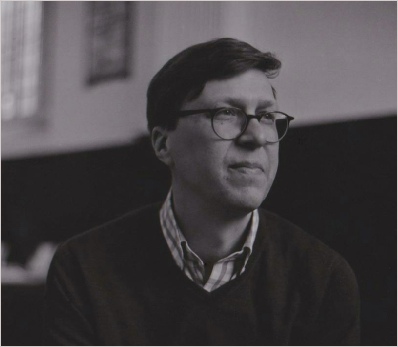
Magnus Granberg
Photo by Anton Lukoszevieze
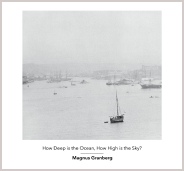
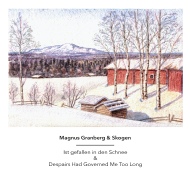
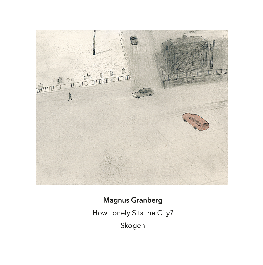
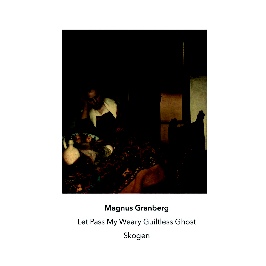
at47 ‘Ist gefallen in den Schnee’ and
at71 ‘Despairs Had Governed Me Too Long’
Sold out, then re-released as a double CD, at4771
Both pieces recorded with Skogen
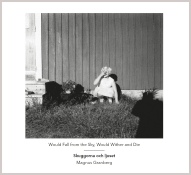
at84 ‘Would Fall from the Sky, Would Wither and Die’
With the Swedish ensemble Skuggorna och ljuset
at87 ‘How Deep is the Ocean, How High is the Sky?’
Recorded in Basel with a mixed ensemble of experimental musicians and players using baroque & Renaissance instruments
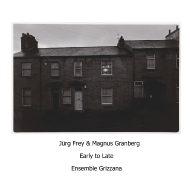
at121 ‘How Vain Are All Our Frail Delights?’
on the CD ‘Early to Late’, with ‘Late Silence’ by Jürg Frey
Recorded with Ensemble Grizzana
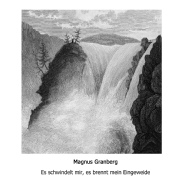
at125 ‘Es schwindelt mir, es brennt mein Eingeweide’
Recorded in Geneva with a small ensemble featuring
members of the Insub Meta Orchestra
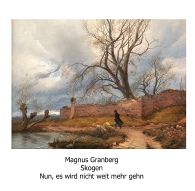
at138 ‘Nun, es wird nicht weit mehr gehn’
Recorded by Skogen
at156 ‘Let Pass My Weary Guiltless Ghost’ Recorded with Skogen
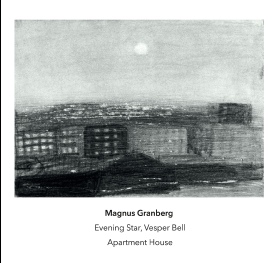
Magnus Granberg on Another Timbre
at188 ‘How Lonely Sits the City?’
Recorded with Skogen
at209 ‘Evening Star, Vesper Bell’
Recorded with Apartment House